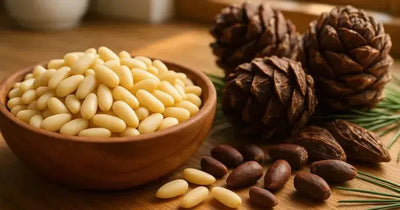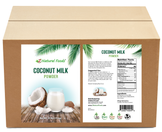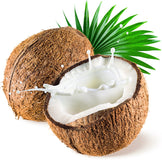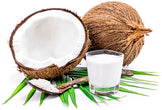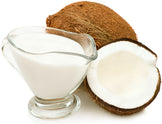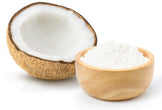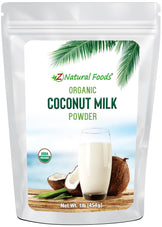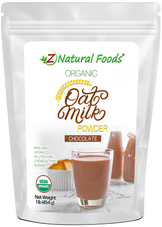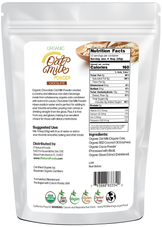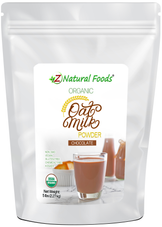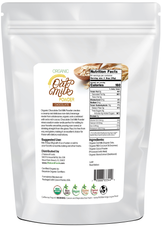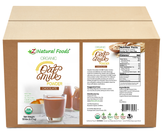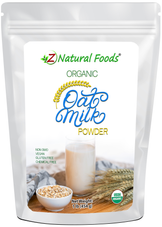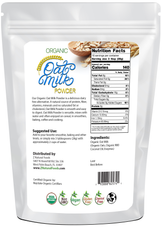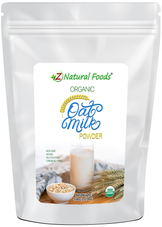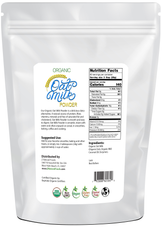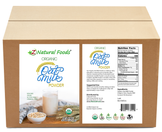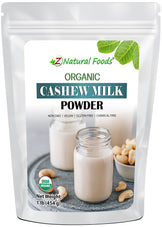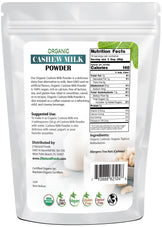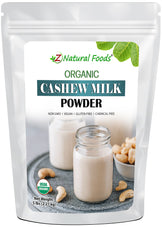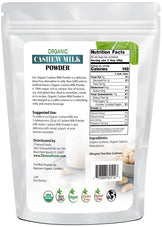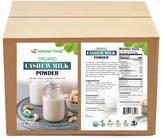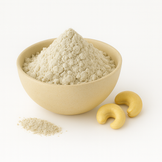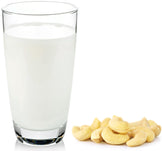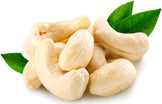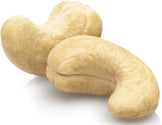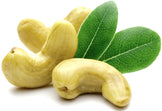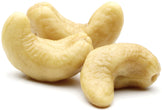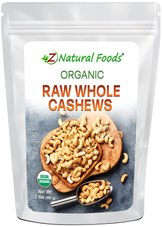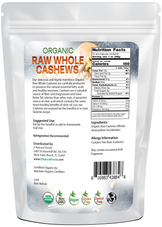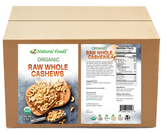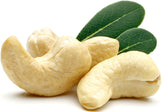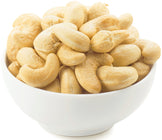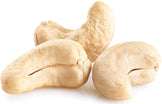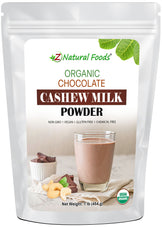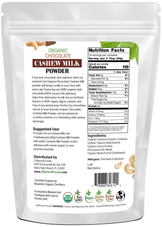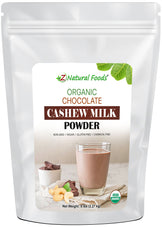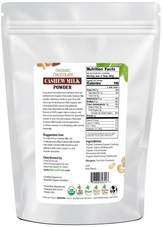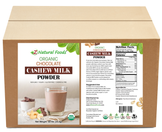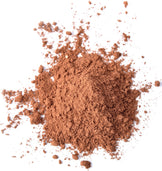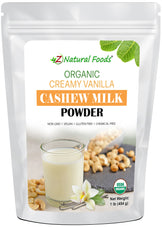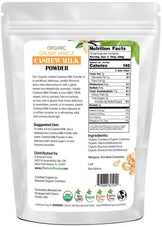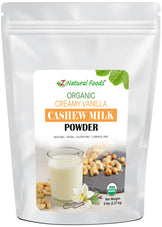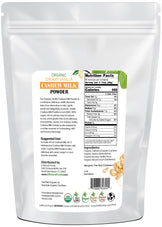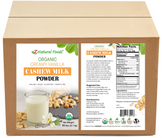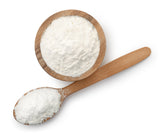Description
Description
Whether creating creamy and delicious dairy alternatives or simply using them as a viable substitute in baking or cooking, we have come to understand that oat, cashew, and coconut milk are highly versatile foods with limitless applications.
But, of these plant-based milk options, what is the healthiest?
What is the healthiest plant-based milk?
These plant-based milk products each have unique qualities. Some people prefer the fatty acid profile of coconut milk over the fiber content of oat milk. Others prefer the broad nutrient profile, including magnesium, of cashew milk. One is generally not better than the other related to functionality, versatility, and which best suits your nutritional needs.
Our mission is to answer your questions and provide a thorough explanation and the critical details necessary to understand the topic.
So, today let’s dig in and explore the answer to …
But first, let’s define what healthy means
To answer this main question, we first need to get clear on what is meant by “healthy”. After all, not all definitions are alike.
Every culture defines how and why an individual food is considered “healthy” based on various factors.
According to western medicine, healthy food is a substance that provides the nourishment needed to sustain well-being and retain energy.
Traditional Chinese Medicine looks at food from a slightly different perspective. According to TCM, food is not defined as healthy or unhealthy but, instead, if it is the right food for an individual at a specific time.
In TCM, the principle behind nutrition is called the five elements theory diet and believes that the energetic effects foods can have on the body (warming, cooling, drying, moistening) are what dictate how one should eat. But there are also general guidelines for different times of the year.
For example, TCM believes that it is best to eat most foods cooked and warm during the cold months of winter for better digestion and utilization and to keep you warm and well-nourished.
In the warm summer months, when people are out and moving around, TCM generally looks at lighter, more cooling diets with more fresh produce as naturally healthy.
What are the criteria for defining ‘healthy’?
Good health is defined as the absence of illness and a well-rounded state of physical, mental, and social well-being.
We can all probably agree on this definition.
Health is influenced by many factors like genetics, behavior, environmental and biological influences, and social factors. All of these influences are affected by daily habits that may profoundly affect well-being and longevity.
While hydration, movement, sleep, having outlets, and finding purpose are essential, our food choices for nourishing our bodies are vital.
While the basic standards for what is considered a healthy food often come down to whether it has essential nutrients to sustain life, here at Z natural foods, we like to take it up a notch.
We consider healthy foods as getting a well-rounded superior level of nourishment that allows you to thrive and not just survive.
With that, let’s now compare these incredible plant-based milk products.
What’s healthiest: Oat milk vs. Coconut milk vs. Cashew milk
Oat Milk
Oat milk is a dairy-free alternative to cow’s milk created by blending oats and water and straining the mixture. This process would produce excellent, creamy oat milk in a perfect world. Unfortunately, this is not the case, as you often end up with a slimy, gel-like concoction.
If you have ever made oatmeal, you know this is the same end product. When you soak oats in hot water, they swell and gelatinize due to how the starch reacts to the heat.
The starch in oats comprises two kinds of sugar; Amylose (Is hydrosoluble and starts to break water down) and Amylopectin (Absorbs water and can swell up to ten times its size).
Once free, amylose begins bonding with other molecules, resulting in this gel-like consistency.
For this reason, oat milk must undergo an enzymatic process to create a creamy, silky-smooth texture. The primary enzyme used in the “desliming” process is amylase, commonly found in bananas, mangos, and papayas. Amylase is an enzyme specific for breaking down starches.
In oats, it will turn the long sugar chain amylose and amylopectin structure into smaller chains of glucose, preventing the typical gelatinous-like result.
Once these sugars break down, they will give your oat milk a naturally sweet taste.
Polysaccharides and Beta Glucans
Polysaccharides are large carbohydrate molecules containing many small sugar molecules(monosaccharides)bonded together and are the most abundant carbohydrate found in food.
Oats are deemed a quality source of non-starch polysaccharides, which make up around 60% of their total soluble fiber.
Beta Glucans are a type of polysaccharide and soluble fiber from the cell walls of plants, fungi, and grains. The primary component of the non-starch polysaccharides in oats is beta-glucans 1-3 and 1-4 (A total of 4% beta-glucans). Studies show that these non-starch polysaccharides found in oats potentially support a wide range of factors related to metabolic syndrome.
A review of the role of non-starchy polysaccharides in human nutrition determined that NSP’s compounds correspond to dietary fiber and show various effects in both the small and large intestines.
A randomized control study looking at oat beta-glucan's effect on serum cholesterol showed a significant reduction in total and LDL cholesterol.
Finally, in the Journal of Nutrition and Metabolism, the following was stated about beta-glucans effect on obesity and metabolic syndrome; “It is clear that β-glucan is an important food component in the modulation of metabolic dysregulations associated with the metabolic syndrome.”
For an excellent article about how oat milk specifically compares to coconut milk, go here:
Oat milk vs. coconut milk: What’s better for you?
For more information about our Oat Milk powder, go here:
Coconut Milk
Previously, coconut was considered unhealthy due to its high saturated fat content.
However, it has now been shown that the fat contained in coconut is unlike any other fat on earth and has high nutritional value.
The Coconut Research Center explains, “The vast majority of fats and oils in our diets, whether saturated or unsaturated or come from animals or plants, are composed of long-chain fatty acids (LCFA).”
All fatty acids share the same basic structures; One carboxyl group is attached to a chain of carbon atoms. Long-chain fatty acids have 13-21 carbon atoms in their tails.
Some 98 to 100% of all the fatty acids you consume are LCFA.
Coconut is known to have MCFA or medium-chain fatty acids, also called MCT or medium-chain triglycerides containing 6-12 carbon atoms.
MCFA are metabolized by the human body differently because of their size. They are rapidly broken down and go straight to the liver, where they are used as an instant energy source or turned into ketones.
Ketones are created when insufficient sugar or glucose supplies the body’s fuel needs. Unlike the saturated and unsaturated fats in vegetable oils, eggs, milk, and meats, which contain LCFA, coconut is a rare dietary source of MCFA and, therefore, highly beneficial to the body and overall health.
Only recently has modern medical science unlocked the secrets to coconut’s unique healing powers.
Coconut’s fatty acid breakdown:
- Caprylic Acid C-8:0 (8%)
- Caprylic Acid C-10:0 (7%)
- Lauric Acid C-12:0 (49%)
- Myristic Acid C-14:0 (8%)
- Palmitic Acid C-16:0 (8%)
- Stearic Acid C-18:0 (2%)
- Oleic Acid C-18:1 (6%)
- Linoleic Acid C-18:2 (2%)
According to an article titled The properties of Lauric acid and their significance in coconut oil, “the primary fatty acid of coconut oil is lauric acid, which is present at approximately 45–53 %. The metabolic and physiological properties of lauric acid account for many of the properties of coconut oil.
Coconut oil is rapidly metabolized because it is easily absorbed, and lauric acid is easily transported. Detailed studies have shown that most ingested lauric acid is transported directly to the liver, where it is converted to energy and other metabolites rather than stored as fat. Such metabolites include ketone bodies, which can be used by extrahepatic tissues, such as the brain and heart, as a quick form of energy.
Studies on the effect of lauric acid on serum cholesterol are contradictory. Among saturated fatty acids, lauric acid has been shown to contribute the least to fat accumulation.”
For more helpful articles about a variety of delicious topics related to Coconut Milk, visit these resources:
For more information about our Organic Coconut Milk, go here:
Cashew Milk
Cashew nuts are kidney-shaped seeds that adhere to the bottom of the cashew apple, the fruit of the cashew tree, which grows naturally in tropical climates.
The delicately flavored cashew nut makes delicious milk that is dairy-free and perfect for any lifestyle. But this delightful milk alternative provides more than a creamy texture and taste to your favorite beverages. Organic cashew milk is high in nutrition and as heart-healthy as olive oil.
Cashews have a broad spectrum of nourishing fats. Approximately 75% of their fat is unsaturated fatty acids, plus about 75% of this unsaturated fatty acid content is oleic acid, the same heart-healthy monounsaturated fat found in olive oil.
Cashews are also a nourishing source of the unsung hero in the mineral world; magnesium.
Magnesium may play numerous critical roles throughout the body and is a cofactor of more than 300 biochemical enzymatic reactions supporting human health. Human studies have linked magnesium to supporting healthy memory and blood pressure levels and potentially reducing risk factors associated with metabolic syndrome.
Magnesium also may support a healthy nervous system for a more calming and peaceful mindset.
Organic cashew milk is high in nutrition, including:
- Minerals: Calcium, Iron, Magnesium, Phosphorus, Potassium, Copper, Zinc
- Vitamins: Vitamin C, Thiamin, Riboflavin, Niacin, Vitamin B-6, Folate, Vitamin A (RAE), Vitamin E (Alpha), Vitamin D, Vitamin K
- Essential Fatty Acids- Omega 3 and omega 6
- Amino Acids: Tryptophan, Threonine, Alanine, Isoleucine, Leucine, Lysine, Methionine, Cystine, Phenylalanine, Tyrosine, Valine, Arginine, Histidine, Aspartic acid, Glutamic acid, Glycine, Proline, Serine
- Sterols: Campesterol, Stigmasterol, Beta-sitosterol
A randomized, crossover, controlled-feeding trial showed that daily consumption of cashews substituted for a high-carbohydrate snack may support healthy LDL and total cholesterol levels.
For a fun and healthy article about a common pairing with cashew milk, go here:
For more information about our Cashew Nut Milk powder, go here:
So what’s the healthiest plant-based milk?
Unfortunately, there’s no clear-cut answer.
Some find that they prefer the unique fatty acid profile of coconut milk over the carbohydrate and fiber content of oat milk. While others prefer the broad nutrient profile, including magnesium, of cashew milk.
Ultimately, all three of these dairy-free alternatives each have unique nourishing qualities.
So, the answer to “Which plant-based milk is healthiest” is based on your current way of eating and your specific needs.
Truth be told, one is generally not better than the other.
It all comes down to functionality, versatility, and which suits your particular nourishment needs.
To review all of our milk and cream products, go here:
References
- Kumar V, Sinha AK, Makkar HP, de Boeck G, Becker K. Dietary roles of non-starch polysaccharides in human nutrition: a review. Crit Rev Food Sci Nutr. 2012;52(10):899-935. doi: 10.1080/10408398.2010.512671. PMID: 22747080.
- Queenan KM, Stewart ML, Smith KN, Thomas W, Fulcher RG, Slavin JL. Concentrated oat beta-glucan, a fermentable fiber, lowers serum cholesterol in hypercholesterolemic adults in a randomized controlled trial. Nutr J. 2007 Mar 26;6:6. doi: 10.1186/1475-2891-6-6. PMID: 17386092; PMCID: PMC1847683.
- El Khoury D, Cuda C, Luhovyy BL, Anderson GH. Beta glucan: health benefits in obesity and metabolic syndrome. J Nutr Metab. 2012;2012:851362. doi: 10.1155/2012/851362. Epub 2011 Dec 11. PMID: 22187640; PMCID: PMC3236515.
- Dayrit, F.M. The Properties of Lauric Acid and Their Significance in Coconut Oil. J Am Oil Chem Soc 92, 1–15 (2015). https://doi.org/10.1007/s11746-014-2562-7
- Mah E, Schulz JA, Kaden VN, Lawless AL, Rotor J, Mantilla LB, Liska DJ. Cashew consumption reduces total and LDL cholesterol: a randomized, crossover, controlled-feeding trial. Am J Clin Nutr. 2017 May;105(5):1070-1078. doi: 10.3945/ajcn.116.150037. Epub 2017 Mar 29. PMID: 28356271.
